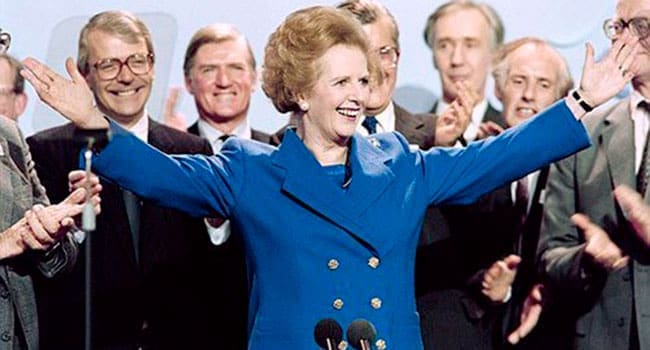Margaret Thatcher had a radical streak and a thirst for combat that the men she led didn’t share

Margaret Thatcher had her final prime ministerial audience with the Queen on Nov. 28, 1990. Despite having won three consecutive general elections and never losing a parliamentary vote of confidence, she was evicted from office against her will.
The dramatic story is comprehensively told in Herself Alone, the third and final instalment of Charles Moore’s splendid biography.
It’s a tale of conspiracy and hubris.
Ultimately, though, the United Kingdom’s first female prime minister was undone by the same personal characteristics that propelled her to power in the first place.
 |
| Related Stories |
| Thatcher didn’t blink in defence of the Falklands 40 years ago
|
| Margaret Thatcher and the end of apartheid
|
| If Bobby Kennedy had been more like Margaret Thatcher
|
Thatcher was always an odd fit.
The ambitious scholarship girl who made her way in an overwhelmingly male world had none of the clubiness that added a layer of protection for more conventional politicians. Truth be told, she didn’t really belong.
Her 1975 accession to the Conservative Party leadership had been a function of three things: the party’s dire straits, her own fortitude and the unwillingness of male competitors to take the risk of challenging then-leader Edward Heath.
In other circumstances, Thatcher wouldn’t have been the obvious choice, probably not even a serious contender.
And Thatcher was always living dangerously. By the end, to quote Moore, “most colleagues were understandably sick to death of her.”
Politicians are often an ambitious lot and the fact is that Thatcher was blocking the way. After 15 years as leader and 11 as prime minister, her presence was choking up the system.
If you were a cabinet minister who fancied a shot at the top job, she had to go. And if your sights were a little lower – say, you just wanted a promotion – movement at the top would loosen things up and maybe create an opportunity for you.
There was also a concern about the party’s prospects in the next election. Thatcher’s standing with the general public had taken a hit and the danger of losing seats – and perhaps even the parliamentary majority – was deemed real.
Genuine policy differences played a part, too.
Although Thatcher had supported British entry into a union of European nations, she wasn’t nearly as enamoured as some of her colleagues about the way things were developing. Anything that smacked of drawing Britain into a single currency was anathema to her.
And being who she was, she didn’t mince words. Europhiles – of which there were many in the upper reaches of the party establishment – were appalled.
Then there was her personality and management style. With senior colleagues, she could be rude, ungenerous and obnoxious.
Moore writes of the extreme contrast between her “ability to inspire the love and loyalty of her immediate staff … secretaries, advisers, detectives, drivers and so on who worked for her and her ability to insult and antagonize those, chiefly Cabinet ministers, who worked with her.”
Respectful and often kind to the little people she dealt with, Thatcher was unsparing of those who considered themselves her peers. They were, after all, potential rivals.
But humiliating those you might later depend on isn’t a good plan, particularly in a clubby culture like that prevailing in Westminster. So when the chips were down, ostensible allies went absent and a goodly number actually conspired against her.
After former minister Michael Heseltine challenged Thatcher’s leadership in 1990, her first ballot majority fell slightly short of the required 15 percent margin. At that point, the surreptitious alliance against her upped its game.
Likened to circling sharks waiting for traces of blood in the water, they moved to convince her to stand down in order to avoid a second ballot humiliation. Three years later, she described it as “treachery – with a smile on its face.”
Still, it worked. Thatcher withdrew and one of the cagiest plotters – John Major – ascended in her place. The tribe finally expelled the intruder.
Moore draws a fundamental distinction between Thatcher and the men she led.
She had a radical streak and a thirst for combat that they didn’t share. She made them uneasy and they didn’t like that. And while they sought to render her “manageable,” she resisted.
Had she been a different person, she’d have read the signs, rested on her laurels and called it a day a year or so earlier. But she couldn’t conceive of any other life.
In Moore’s poignant words: “As she had begun, so she ended, a woman isolated in a man’s world – herself alone.”
Pat Murphy casts a history buff’s eye at the goings-on in our world. Never cynical – well, perhaps just a little bit.
For interview requests, click here.
The opinions expressed by our columnists and contributors are theirs alone and do not inherently or expressly reflect the views of our publication.
© Troy Media
Troy Media is an editorial content provider to media outlets and its own hosted community news outlets across Canada.

